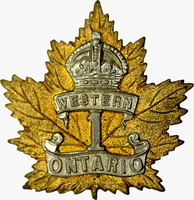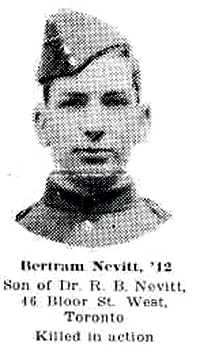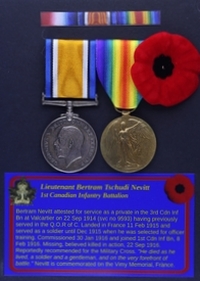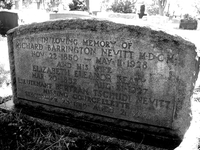
Lieutenant Bertram Tschudi Nevitt
3rd Canadian Infantry Battalion
1st Canadian Infantry Battalion
By: Capt (ret'd) Michael M. O'Leary, CD, The RCR
Bertram Nevitt was born in Toronto, Ont, on 25 Aug 1895. he was a son of Dr. Richard Barrington Nevitt. Dr. Nevitt's life was captured in the 2001 film "The Great Lone Land: The Life of R.B. Nevitt." Synopsis: "Richard Nevitt fled Savannah Georgia at the age of 14 after being drafted by the Confederacy. Settling first in Quebec, he studied medicine, then signed up as a doctor with the RCMP's famous Great March West of 1874. Helping to chase violent American "whisky-traders" out of the Canadian West, Dr. Nevitt's care of local natives won him their respect; and his many sketches created a valuable historical record of the peaceful settling of the West. Later in life he would become a leader in the cause of women's health and would help found Canada's first women's hospital."
The Nevitt family can be found in the 1901 Canadian Census. Father "R.B." and mother Elizabeth are identified with six children; Robert (b. 23 May 1879, age 22), Mary (b. 24 Jul 1880, age 21), Irving (b. 16 Jan 1882, age 19), Adna (b. 9 Feb 1884, age 17), Richard (b. 25 Aug 1890, age 11), and Tschude (sic) (b. 14 May 1895, age 6). The family was sufficiently well-off that they had two domestic servants listed in the Census as residing at the family home. Curiously, the family does not appear in the available data for the 1911 Census, but that may be a result of poor hand-writing and resultant transcription, or lost documents.
Bertram Nevitt enrolled in the Canadian Expeditionary Force (C.E.F.) on 22 Sep 1914 with the 3rd Canadian Infantry Battalion at Valcartier, P.Q., where the First Contingent of the C.E.F. was being assembled. On his attestation paper Nevitt is described as 5 feet 8 1/2 inches in height, weighing 135 pounds, with a 35-inch chest, a fair complexion, brown eyes, and brown hair. As a soldier of the 3rd Battalion, he was assigned the service number 9593. Nevitt identified his father, Dr. Richard Barrington Nevitt as next of kin. The family address was 46 Bloor St. West., Toronto, Ont.
The 3rd Battalion sailed from Quebec City aboard the S.S. Tunisian on 25 Sep 1914. and arrived in England on 16 Oct. While the battalion was training at Bustard Camp, Nevitt would encounter the military justice system. On 11 Nov 1914, he was deprived of one days' pay for absence.
On 11 Feb 1915, Nevitt and the 3rd Battalion crossed the Channel for France, arriving at St. Nazaire. Nevitt would spend almost all of 1915 serving in the ranks of the battalion. The list of Battle Honours for 1915 awarded to the unit and published in General Order No. 123 of 1929 provides a glimpse of the actions he would have participated in. Dates given are those specific for award of the Battle Honour, while operations in each sector often extended well beyond those dates:
- Ypres, 1915 (22 April — 25 May 1915)
- Gravenstafel Ridge (22-23 April 1915)
- St Julien (24 April — 4 May 1915)
- Festubert, 1915 (15-25 May 1915)
Nevitt's potential for advancement was recognized while he was a young private. On 18 Jun 1915, he was appointed Lance Corporal, the lowest supervisory rank. Nevitt's service record notes that on 9 Jul 1915, he "returned to duty from H.Q.S.S. and reverts to the ranks," i.e., returned to the rank of private. It does not, however, provide information on how long he had been employed with the Headquarters Subordinate Staff.
On 1 Aug 1915, Nevitt was admitted to No. 3 Canadian Field Ambulance in 1 Aug 1915 and returned to duty the following day. The reason why he reported sick was not noted. Nevitt was granted seven days leave from 1 Nov 1915 and returned to the unit on 9 Nov 1915. Six weeks later, on 15 Dec 1915, he was attached to the Cadet School for officer training.
After only six weeks of officer training, Bertram Nevitt was granted a Commission as a Temporary Lieutenant and posted to the 1st Canadian Infantry Battalion on 30 Jan 1916. He reported for duty with the 1st Battalion in the field on 8 Feb 1916. A few weeks after arriving at the unit, Nevitt attended a course at the Training School, 1st Canadian Division, commencing 25 Feb 1916 and returned to his unit on 8 Mar 1916.
Other than proceeding on leave in England on 19 Jun 1916 and returning ten days later, Betram Nevitt was with the 1st Battalion throughout the spring and summer of 1916. The so-named "Battle Bar Ledgers" prepared after the war by the Department of Defence (in anticipation of clasps being issued for the British War Medal) describes the steady rotation between front line trenches and reserve positions at brigade, Division, and corps levels. This schedule was the foundation of the infantryman's experience throughout the Great War, punctuated at random intervals with days of intense activity as the opposing forces contested one section of the trench lines of land or another.
It was during one of these periods of heightened activity that Bertram Nevitt's war would end in tragedy. One night in September of 1916, as the 1st Canadian Infantry Battalion was attacking the German lines, he would fall in battle. In the reporting of casualties after the attack, Nevitt would be listed as "Reported missing, believed killed in action" on 22 Sep 1916.
The battalion's Battle Bar document offers the following summary of activities for 21-23 Sep 1916:
- 21-23 Sep 1916 ; Forward Line of Troops (Sheet 57.c.SW South & East of COURCELETTE M.25.b. & M.19.d.)
- 21st — Enemy bombing attacks repulsed
- 22nd — 8.29 p.m. attack made on enemy line, captured and consolidated line as follows:— M.25.d.8.6 — 6.9 — M.25.b.0.0 — M.26.a.1.7 — 0.7 — M.19.d.7.0.
- 23rd — Small bombing attacks repulsed.
The 1st Battalion's War Diary offers a detailed description for the days immediately prior to and the day of Bertram Nevitt's death:
COURCELETTE
20 Sep
- "7 p.m. – Relief commenced but was not reported completed until after midnight.
- Dispositions:— Bn H.Q. at R.36.A.49 (150 N.W. of SUGAR FACTORY); 'C' Co. in close support in SUGAR TRENCH and CANDY TRENCH; 'B' Co. in right sector front line, SUNKEN ROAD from BAPAUME Rd, to M.25.B.6.2; 'D' Co. in centre sector from M.25.B.6.2 to CEMETERY; 'A' Co. on right, in and around QUARRY.
21 Sep
- "12.40 a.m. – Enemy commenced bombing on centre sector, and when our bombers retaliated opened up heavy artillery fire. Our guns replied and situation was quiet by 1.25 a.m.
- 3.00 a.m. – Conference of Coy. Commanders regarding operations against maze of enemy trenches opposite our area.
- 3.15 a.m. – Germans attempted bombing raid near QUARRY, without success. Bombing also on our right sector in which our men gained upper hand. About same time Germans broke through the gap in our lines to the left of the cemetery. They were beaten back by our Lewis Guns and by our Bombers who used German hand grenades. Scores of flares, red, white, and green, were sent up and a heavy barrage was put over COURCELETTE. By 3.35 a.m. our superior weight of gun fire had almost silenced the enemy's batteries, but a number of heavies continued to fall around the SUGAR FACTORY.
- 4.25 a.m. – Renewed bombing on right sector.
- 4.48 a.m. – Heavy barrage over COURCELETTE was repeated, and our front line (SUNKEN ROAD) was enfiladed with whizzbangs. At 5.00 a.m. a further attack was lodged by the enemy against centre section. This was beaten back. The casualties among our front line men were fairly heavy. Lieut. POPE was wounded and Lieut. HUTTON slightly wounded in the fighting near the Cemetery. 'B' Coy. in the morning's work suffered no less than 48 casualties. Many battalion Bombers and several Lewis Gunners were killed and wounded.
- 8.00 a.m. – Situation quiet. O.C. 'A' Co. reports "The men are nearly worn out and in no shape to go into an operation tonight." O.C. 'D' Co. reports "Two platoons lost way during relief and got into forward saps, it was impossible to get them back before daylight. Many were killed and wounded during the morning and at least one of the advanced Lewis Guns was demolished. The men in SUNKEN ROAD position are absolutely done up. We are in no shape for any show."
- Noon. – Reports sent to 1st. C.I.B. re condition of troops and asking that operations be postponed 24 hours. Brigade agreed with proposal.
- 2.30 p.m. – Operation Order No. 20 issued. (Appendix [unfortunately, this Order is not in the surviving War Diary])
- 3.00 p.m. – Casual shelling of COURCELETTE. Otherwise situation quiet throughout the afternoon. Our aeroplanes were unusually active directing the fire of our batteries.
- 11.15 p.m. – 'A' Co. reports "Bombing post established at M.19.d.3.5 Absolutely isolated by day"
- Midnight. – very quiet. Men able to rest and improve trenches and communications.
22 Sep
- "Fine. Midnight 21/22 Major Ashplant reported that relief of 4th Bn. parties in advanced saps had been completed and that heavy casualties had been suffered by 13 and 14 platoons.
- 1 a.m. – COURCELETTE again under barrage.
- 2 a.m. – Enemy shelling SUNKEN ROAD and QUARRY; hostile snipers active.
- 2.40 a.m. – Capt. Coleman gives disposition of 'B' Co. when withdrawn for our bombardment as follows. 2 platoons in MACPHERSON trench, two platoons in SUGAR trench.
- 4 a.m. – Maj. JEWITT withdraws 'D' Coy's front line garrison to old German dug outs in SUNKEN ROAD. Major NELLES holds his men in QUARRY.
- 8.50 a.m. – Arrangements made for use of German yellow flares in the attack as signal for "objective reached."
- 11.49 a.m. – Our slow preliminary bombardment proceeds. A few casualties caused by "shorts" in and near COURCELETTE.
- 2.30 p.m. – New orders received from Brigade re aeroplane photographs having shown enemy's defences as being stronger than expected and ordering extension of operations in breadth and depth.
- 4.30 p.m. – O.C. 'A' Co. ordered to hold conference of Coy. Commanders in front line.
- 7.00 p.m. – Conference of O.C's 'A', 'B', 'C' and 'D' Companies at 'D' Company H.Q. Our barrage still short in many places. During afternoon all available men of 'C' Company had been absorbed into front line. Only 18 men were kept back at Battalion Reserve in the SUNKEN ROAD, the remainder being allotted to the various waves.
- "At 8.29 p.m. just as final preparations were being made for advance a murderous artillery and machine gun fire broke against our front, particularly against left sector, which our barrage had not touched. The hostile machine gun fire increased in intensity until 8.31 p.m. at which time our first waves went over the parapet. The enemy used many flares along the whole front, but the advancing waves did not hesitate. They kept close up to our shrapnel barrage.
- "On the right flank the first wave, under Lieut. Cuddy and the second wave in charge of Lieut. Unwin, broke through in spite of German bombs and machine guns and joined their forces at the first German trenches. When within 10 yards of the final objective, Lieut. Unwin was killed by a machine gun bullet. Lieut. Cuddy was in the most advanced German line, and in the act of sending up the signal of his company's success, when he was hit by a bomb. He walked into the dressing station during the night, but eventually died of his wounds. Sergt. Ironsides carried on until the arrival of Capt. Baxter. 'B' Company went into the fight with a totel of 94 all ranks, including bombers and machine gunners attached. They lost many brave men, but they broke down the stubborn opposition offered by the enemy bombing posts, and when Capt. Coleman, later in the evening took up supports he was able to establish the line and secure communication with the flanks. 'B' Company took as prisoners 1 Officer and 18 other ranks, besides capturing large quantities of booty. Much useful information was obtained from the prisoners.
- "In the centre lay the greater part of the German trenches, here the execution of our guns was most perfect, the resistance of the enemy was weakest, and the objective was reached most quickly. The 1st wave on the right rushed forward, commanded by Lieut. J.L. YOUNGS (from 'A' Company) and scarcely stopped until the final objective had been secured. A number of our men fell in the advance, but one officer was made prisoner and 12 unwounded Germans also taken. In addition, Lieut. YOUNGS sent back as trophy a Vickers Gun having bombed its German crew.
- "The first wave on the left of the company was more unfortunate. Major ASHPLANT, in charge of this section, was last seen leading his men in the advance. He is Missing, believed killed. The survivors of his party who were collected later could give no definite story as to his end. The second wave for the whole company frontage was in the act of "going over" when its leader, Sergt. COLLINS, was killed by a bursting shell. This wave went over, and soon reported to Lieut. YOUNGS in his new front line. German hand grenades were used by the attackers to win their way along the German main trench, the communication trenches, and the saps. German bombs, rifles and ammunition were used to hold the new ground against counter attacks. During the night the situation was cleared up. Blocks were established right and left in the new line. Lieut. MILLARD went out early in the morning and partially connected up with the left. All wounded were moved back from the newly gained trenches.
- "On the left sector the attack fell down — due to no failing of the attackers. They went out from around the quarry into the impossible belt of German Machine Gun fire. The first report of their fate came from returning wounded about 8.50 p.m. and it was to the effect that the waves had been practically annihilated. No reports were received at any time from either Lieut. NEVITT or Major AYTOUN. The former, who took over the first wave, was last seen by a wounded bomber. The officer was then still firing his revolver, and German bombs were falling close in front of him. All attempts to find Lieut. NEVITT's body were without results. Major AYTOUN was twice wounded as he led his men. After the second hit he fell, and his last words were "Carry On, take charge!" His body was recovered the same night, nearer to the German trenches than our own.
- "The enemy made no attempts to counter attack before midnight. During the night's operations, two Lewis Guns were completely destroyed by shellfire.
- "The new line, in course of consolidation on the night of Sept. 22/23rd was as follows:— M.25.d.8.6. — 6.9 — M.26.a.1.7 — M.26.a.0.7 — M.19.d.7.0.
- "Two posts were also established about M.19.d.6.0 ½ and M.25.b.5 ½.9.
- "During the night the 69th Brigade (Imperial) on our right flank, was relieved by the 68th Brigade.
On 30 Sep 1916, Nevitt's death was announced in the Toronto Star, a brief note read:
"Lieut. Bertram T. Nevitt, who was killed in action, enlisted as a private with the 3rd Battalion. He received his commission at Festubert. He was 21 years old, and was educated at St. Alban's school, the Model School, and Jarvis street Collegiate. He had just taken his honor matriculation when he enlisted. He is the son of Dr. R.B. Nevitt, 46 Bloor St. West. His brother, Mr. Richard Nevitt, is with the firm of Pellatt & Pellatt, stock brockers."
Two months later, on 30 Nov 1916, a longer notice appeared in the Toronto Star newspaper. In it were details of Nevitt's service that must have come either from his own letters home or those of others written to the family after his death. The report that he had received the Military Cross was incorrect:
"Lieut. Nevitt Missing
"Lieut. Bertram T. Nevitt, son of Dr. Barrington and Mrs. Nevitt, 46 Bloor west, reported missing, and winner of the Military Cross, has been in the trenches since going over with the First Contingent. Lieut. Nevitt was only 19 when he enlisted, and celebrated his 21st birthday in the trenches last August. He has been with the First Contingent without receiving any leave since reaching France. Lieut. Nevitt went overseas with the 3rd Battalion as a private, and in December, 1915, received his commission in the field.
"He was then transferred to the "Fighting First" Battalion, and was in command of "A" Company.
"On one occasion when his superior officers were killed he held the trench for 48 hours without food or water and withdrew without loss of a man.
"At another time he saved the life of a chum, who fell beside him. Lieut. Nevitt saw that his friend would bleed to death, and, picking him up, carried him to the dressing station. His commanding officer in writing to his mother, says:
"When last seen Bertie was in a shell hole in No Man's Land, firing his revolver at the Germans. Since I last wrote you, that area has been thoroughly searched and no trace found of him whatever. We miss him, not sometimes, but all the time. Bertie was one of the whitest boys I ever met (sic), and his sense of honor and decency compelled respect from all who knew him."
"He had been recommended for the Military Cross, for I was acting adjutant at the time, and forwarded the recommendation myself, after it had been signed by the C.O. There are no honors given posthumously except the V.C., but if ever any one deserved decoration Bertie did. There is one consolation. He died as he lived, a soldier and a gentleman, and at the very forefront of battle. More could be said of no man. We all want to express to you, as well as lame words can, our deepest, most sincere and most respectful sympathy in these sad days for you all. With fellows like Bertie one can say in spite of everything: "He is not dead, but liveth."
"Lieut. Nevitt would have received his commission as captain if he had survived the engagement. He is a nephew of Mrs. Russell Snow."
Nevitt had assigned $15 monthly from his pay to his mother, amounting to about half of his pay as a private soldier. This pay assignment continued after his commissioning, and was not finally stopped until 1 Jan 1917.
It was not until 3 May 1917 that Nevitt was officially recorded as "Previously reported missing and believed killed, now for official purposes presumed to have died on or since 22 Sep 1916."
Bertram Nevitt's medals were despatched to his father in Toronto, Ont., on 22 Apr 1922. He was entitled to the 1914-15 Star (named to him as a Private of the 3rd Battalion), and the British War Medal and Victory Medal, named to him as a Lieutenant. In addition his family received a Memorial Plaque and Scroll, and his mother receives a silver Memorial Cross. The Cross was mailed to the family on 9 Jun 1920, and the Plaque on 17 Aug 1922.
Lieutenant Bertram Tschudi Nevitt is commemorated on the Vimy Memorial.
Pro Patria
Visit a randomly selected page in The O'Leary Collection (or reload for another choice):
- The O'Leary Collection; Medals of The Royal Canadian Regiment.
- Researching Canadian Soldiers of the First World War
- Researching The Royal Canadian Regiment
- The RCR in the First World War
- Badges of The RCR
- The Senior Subaltern
- The Minute Book (blog)
- Rogue Papers
- Tactical Primers
- The Regimental Library
- Battle Honours
- Perpetuation of the CEF
- A Miscellany
- Quotes
- The Frontenac Times
- Site Map
QUICK LINKS
The O'Leary Collection—Medals of The Royal Canadian Regiment
Newest additions:
![]()
![]() SB-12725 Private Henry "Hank" Ard
SB-12725 Private Henry "Hank" Ard ![]()
WIA at Hill 187, Died of Wounds in Japan
![]()
![]() 2355331 Lance Corporal Albert Lorking
2355331 Lance Corporal Albert Lorking
Wounded in action, later a War Amps representative.
![]()
![]() 4334 / 477996 Pte Isaac Hamilton Wilcox
4334 / 477996 Pte Isaac Hamilton Wilcox
Permanent Force, South Africa, and C.E.F.
![]()
![]() 477019 Private Harold Ashcroft
477019 Private Harold Ashcroft
Transferred to the Tunnelers.
![]()
![]() 734231 Private Clark D. Thompson
734231 Private Clark D. Thompson ![]()
The older Thompson brother, killed in action.
![]()
![]() 733849 Private Norman Parker Thompson
733849 Private Norman Parker Thompson
The younger Thompson brother; post-war service in the Special Guard.
![]()
![]()
![]() A305 / 400305 Private Andrew Walker
A305 / 400305 Private Andrew Walker ![]()
"Previously reported Wounded, now Killed in Action."
![]()
![]() 823298 Pte Thomas Patrick Steele, M.M.
823298 Pte Thomas Patrick Steele, M.M. ![]()
… for gallant conduct in the field …
![]()
![]() P13066 Sergeant Harold Thompson
P13066 Sergeant Harold Thompson
Instrumental Soloist for over 20 years of Canadian Army service.
![]()
![]() 9609 / 477728 Private Albert Edward Piper
9609 / 477728 Private Albert Edward Piper
"Arrived from England as a STOWAWAY …"





